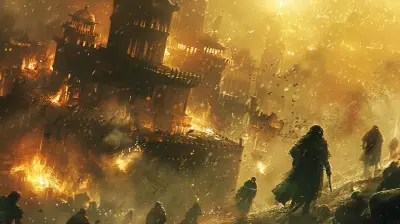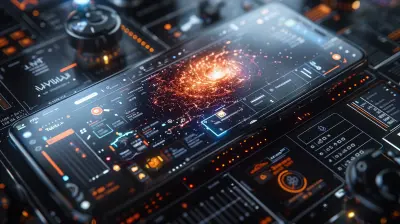Iconic Video Game Characters That Shaped The Industry
9 June 2025
Let’s face it—we all have that one video game character who lives rent-free in our minds. Maybe it’s the plumber in red overalls who’s always saving a princess. Or the brave adventurer who dives headfirst into temples full of traps, treasure, and terror. Whether we grew up in the golden age of arcades or we’re knee-deep in next-gen battles, video game characters aren’t just pixels on a screen—they’re legends.
In this article, we’re diving into the most iconic video game characters that didn’t just entertain us—they redefined an entire industry. These characters turned consoles into culture, inspired millions of gamers (and devs), and became the face of revolutions in gaming.
Ready to go down memory lane? Buckle up—you’re about to meet the MVPs of the gaming world.![]()
🎮 Why Characters Matter in Video Games
Before we dive into the legends, let’s take a moment to appreciate why characters are such a big deal in video games.Think about it: when someone says “video games,” what pops into your head? It's probably not a processor or a game engine. It’s someone like Mario, Master Chief, or Lara Croft. These characters are the face of gaming—and not just because they’ve sold millions of copies.
They’re relatable, aspirational, and sometimes downright weird (yes, we’re looking at you, Sonic). But no matter the genre, these characters carry the plot, the mechanics, and the emotional punch. They’re how we experience the digital world. And in a lot of ways, they’re how we remember it, too.![]()
🧢 Mario – The Go-To Guy Who Jumped Into History
You knew we had to start here.Mario is arguably the most iconic video game character in history, and for good reason. Born in 1981 (originally as “Jumpman” in Donkey Kong), he officially became Mario in 1985 with the classic Super Mario Bros. on the NES.
So why is Mario such a big deal?
- He helped revive the gaming industry after the 1983 video game crash.
- He became the face of Nintendo, one of gaming's biggest giants.
- He's starred in more than 200 games—and counting.
Mario’s appeal is universal. He’s bright, cheerful, and determined—like the video game version of your favorite uncle. And the gameplay mechanics that came with his games? Revolutionary. Platformers owe a massive debt to this mustachioed plumber.![]()
⚔ Link – The Silent Warrior With a Lot To Say
Link, the protagonist of The Legend of Zelda series, might not say much—but boy, does he leave an impact.This green-clad hero first showed up in 1986. Since then, he’s become the symbol of epic adventure. Think of him as gaming’s version of a medieval Indiana Jones—complete with puzzles, oversize monsters, and magical artifacts.
Why Link matters:
- He set the gold standard for action-adventure games.
- He introduced open-world exploration long before it was cool.
- Games like Ocarina of Time and Breath of the Wild raised the bar for immersive storytelling.
He might be silent, but Link’s legacy speaks louder than most.![]()
🏃♂️ Sonic the Hedgehog – The Blue Blur That Defined a Generation
If Mario is the friendly neighborhood hero, Sonic is the rebellious speedster who never sits still. Introduced in 1991, Sonic was SEGA’s answer to Mario—but he didn’t just compete—he carved out his own fanbase entirely.Sonic was fast, edgy, and full of ‘90s attitude. He was the cool kid on the playground and attracted gamers who wanted something a little less squeaky clean.
Sonic’s contributions to gaming:
- He brought speed-based platforming into the spotlight.
- Helped SEGA become a powerhouse in the console wars.
- Showed that character design could influence marketing at a massive scale.
He was more than a mascot—he was a movement.
🔫 Lara Croft – The Fearless Archaeologist Who Broke the Mold
Let’s talk about the leading lady in gaming.Lara Croft debuted in 1996’s Tomb Raider and quickly became one of the most recognizable characters across all media. She wasn’t just iconic because of her looks—she was smart, resourceful, and brave in ways that flipped the narrative for female characters in video games.
What Lara brought to the table:
- She helped normalize action-adventure games with deep lore.
- Broke gender stereotypes in gaming.
- Inspired a wave of strong, independent protagonists.
Lara proved that you didn’t have to be a guy with a gun to be a heroic badass.
🛡 Master Chief – The Quiet Hero in a Green Suit of Armor
When Halo: Combat Evolved launched in 2001, it wasn’t just another sci-fi shooter—it was a phenomenon. And at the center of it all? Master Chief, the armored super-soldier with a heart of gold (we think—he’s pretty quiet).Master Chief didn’t just shoot aliens—he changed how we view first-person shooters.
Why he rocks:
- He made Xbox a must-own console.
- Redefined multiplayer gaming through Halo 2 and Xbox Live.
- Set a new standard for storytelling in FPS titles.
He’s like the Clint Eastwood of gaming—stoic, skilled, and always ready to save humanity.
👾 Pac-Man – The Original Dot-Eating Icon
He might look like a piece of cheese with a mouth, but Pac-Man is a stone-cold legend.Released in arcades in 1980, Pac-Man was a sensation. He wasn’t violent, he wasn’t fast, and he didn’t jump on anything. And yet—he captured our attention with simple mechanics and bright, colorful graphics.
What makes Pac-Man important?
- He attracted a wider audience, including women, back in the '80s.
- One of the first characters to get mainstream recognition.
- Created the template for arcade success.
Pac-Man walked so today’s mobile games could run.
🥋 Ryu – The Face of Fighting Games
Picture this: two fighters, a colorful stage, and a perfectly timed “Hadouken!” If you’ve ever played a fighting game, you owe a lot to Street Fighter’s Ryu.First appearing in the late ‘80s, Ryu became the blueprint for fighting game protagonists.
Why Ryu is still punching above his weight:
- He helped create the competitive fighting game scene.
- Introduced intuitive combo-based mechanics.
- Built a loyal franchise that’s still going strong today.
Ryu’s all about discipline, power, and making sure that fireballs are always on the menu.
🧠 Samus Aran – The Twist No One Saw Coming
In 1986’s Metroid, gamers assumed the suited-up bounty hunter was a dude. But surprise! At the end of the game—bam! Samus Aran takes off her helmet, and she’s a woman.Mic. Drop.
But Samus isn’t just iconic for the twist. She’s iconic because of how she redefined what a hero could be—quiet, mysterious, and endlessly capable.
Samus' big wins:
- She helped shape the “Metroidvania” genre.
- Showed that gender didn’t define skill.
- Starred in a franchise known for its incredible atmosphere and exploration.
She’s still inspiring generations of gamers (and costume designers).
🐉 Solid Snake – The Spy Who Made Us Feel Things
The Metal Gear series took storytelling in games to a whole new level, and Solid Snake was its gravelly-voiced poster child. Equal parts James Bond and Jack Bauer, Snake fought wars, questioned authority, and made us question the cost of conflict.Why Snake slithers into greatness:
- He introduced stealth gameplay to the mainstream.
- Gave us cinematically rich narratives long before that was the norm.
- Tackled adult themes like war, politics, and identity.
Snake didn't just sneak past guards—he snuck into our hearts.
🧟 Leon S. Kennedy – The Cool Guy in a Zombie Apocalypse
Resident Evil has no shortage of memorable faces, but Leon takes the cake as one of the coolest video game characters in any survival horror game.Introduced in Resident Evil 2, Leon was the rookie cop who walked into the worst first day on the job ever. And yet—he kept his cool, protected others, and blasted his way through hordes of undead.
Why Leon stands (and fights) tall:
- Helped define survival horror as a genre.
- Brought cinematic action and horror together beautifully.
- Became a pop-culture icon thanks to his charm and style.
Let’s be honest—Leon made fighting zombies look good.
🧑🚀 Commander Shepard – Your Choices, Your Hero
When Mass Effect came on the scene, it wasn't just another sci-fi shooter. It was a galactic journey where you called the shots—and Commander Shepard was your voice.The cool part? You shaped Shepard’s personality. He or she could be ruthless, diplomatic, hilarious, or romantic. Shepard wasn’t just a character—you became Shepard.
Why players bonded with this intergalactic hero:
- Promoted deep storytelling and player choice.
- Proved that emotional connection in games was possible—and powerful.
- Let players truly feel like the world (or galaxy) revolved around their decisions.
Shepard proved that identity mattered—and that your choices held weight.
👊 Kratos – From Rage to Redemption
Few characters have had a glow-up quite like Kratos. When God of War came out in 2005, Kratos was all about rage, revenge, and slashing through hordes of Greek gods.Fast-forward to the 2018 reboot? And suddenly Kratos is a dad, trying to teach his son how to be better than he ever was.
Why Kratos truly evolved:
- Showcased character development in a way rarely seen in action games.
- Brought real emotion to a genre often all about brute force.
- Blended intense combat with heart-wrenching storytelling.
From shouting “Zeus!” to whispering “Boy,” Kratos has come a long way—and we’ve loved watching it.
Final Thoughts: Characters That Changed The Game
From plumbers to space marines, from silent swordsmen to chatty specters of war—these characters didn’t just entertain us. They helped shape the stories, gameplay innovations, and emotional experiences that define gaming today.They broke molds, crossed genres, and left digital footprints that we still follow. And the best part? New icons are rising every day, waiting to take their place in gaming history.
So the next time you boot up a console or grab a controller, take a moment to thank these legends. Without them, the game just wouldn’t be the same.
all images in this post were generated using AI tools
Category:
Video Game CharactersAuthor:

Francesca West
Discussion
rate this article
3 comments
Lana Evans
Fascinating read! I’m curious—how do you think today’s characters will influence the next generation of games? Are we witnessing the birth of new icons or just recycling old concepts?
June 17, 2025 at 2:53 PM

Francesca West
Thank you! Today’s characters blend innovation with nostalgia, offering fresh narratives while building on classic archetypes. This fusion could create new icons that resonate with future generations, ensuring both evolution and homage in gaming.
Zayla Gray
From pixelated plumbers to sassy hedgehogs, these iconic characters didn’t just shape our screens; they molded our childhoods and fueled countless snack-fueled marathons. Here’s to the digital legends who made ‘game over’ a badge of honor!
June 14, 2025 at 4:53 AM

Francesca West
Absolutely! These characters aren't just pixels; they’re cherished memories that defined gaming for so many of us. Here's to the legends!
Tobias Jones
What a fantastic rundown of iconic characters! It's amazing how much they’ve influenced the gaming landscape. From the heroic jumps of Mario to the adventurous spirit of Link, these characters truly shaped our experiences. Can't wait to see who else makes the list! Keep up the great work!
June 9, 2025 at 3:51 AM

Francesca West
Thank you so much for your kind words! I’m glad you enjoyed the rundown and appreciate the impact these characters have had on gaming. Stay tuned for more!



